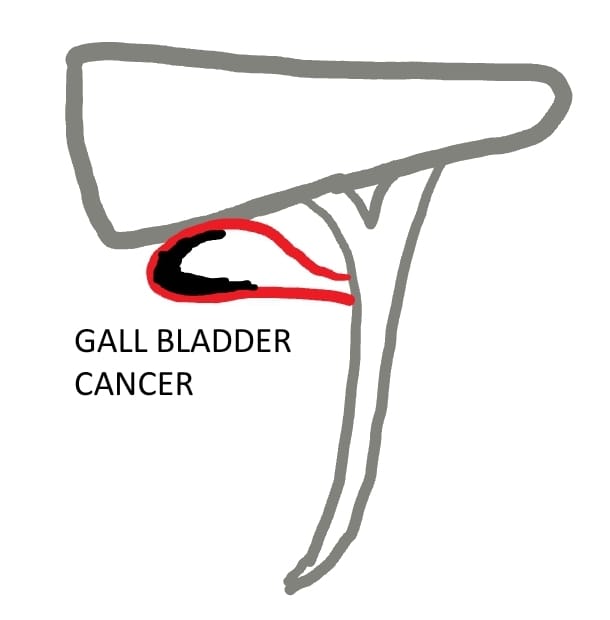If you’re struggling with gastrointestinal diseases, pay a visit to Dr. Dinesh Reddy who is a skilled gastroenterology doctor in Hyderabad. Along with his team of medical specialists, he offers treatments with excellent results to his patients.
Dr. Dinesh understands the various complications of gastrointestinal diseases and the impact they have on our day-to-day lives. Therefore, he works hard to provide optimal care for his patients with a friendly and compassionate approach.
Take the first step towards relief and book an appointment with leading gastroenterology specialist in Hyderabad. Experience the best treatment for gastrointestinal diseases with Dr. Dinesh Reddy and his team of specialists.

Gallbladder Cancer refers to the malignant growth of cells in the gallbladder, a small organ beneath the liver that stores bile. Bile, produced by the liver, aids in digestion by breaking down fats. While relatively rare, gallbladder cancer can be aggressive and challenging to detect in its early stages. It often begins in the innermost layer of the gallbladder and can spread to nearby organs.
The exact cause of gallbladder cancer remains unclear, but several risk factors may increase its likelihood. These include:
Detecting gallbladder cancer in its early stages can be challenging as it often remains asymptomatic. However, as the disease progresses, individuals may experience:
Diagnosing gallbladder cancer typically involves a combination of imaging tests, biopsies, and laboratory tests. Common diagnostic methods include:
Treatment options for gallbladder cancer depend on the stage of the disease and the overall health of the patient. Common approaches include:
It’s crucial for individuals at risk or experiencing symptoms to consult with healthcare professionals promptly. Early detection and a comprehensive treatment plan can significantly improve outcomes for gallbladder cancer patients. Regular check-ups and a healthy lifestyle may also contribute to prevention and early detection.
Gallbladder cancer may show early signs such as abdominal pain, particularly on the upper right side. You might feel unusually full or bloated, even after small meals. Unexpected weight loss and jaundice (yellowing of the skin or eyes) can also be indicators. Pay attention if you experience changes in your appetite or if you feel tired more than usual. Keep in mind that these signs can be caused by various conditions, but if you notice persistent or worsening symptoms, it’s essential to consult a healthcare professional promptly for a proper evaluation.
Yes, having gallstones can slightly raise the risk of developing gallbladder cancer, although it’s not a common occurrence. Gallstones are hard particles that form in the gallbladder, and over time, they can lead to inflammation. In some cases, prolonged inflammation may contribute to the development of cancerous cells. It’s essential to note that most people with gallstones do not develop gallbladder cancer.
No, gallbladder cancer is generally not hereditary. This means it doesn’t usually pass directly from parents to children like some other conditions might. Gallbladder cancer is more often associated with factors like age, gender, and certain health conditions, rather than being passed down through families. It’s crucial to maintain regular check-ups with healthcare providers, especially if there’s a family history of gallbladder issues or cancer, to catch any potential concerns early. Always consult with a medical professional for personalized advice and information based on your specific health situation.
Unfortunately, gallbladder cancer is challenging to prevent entirely. However, adopting a healthy lifestyle may reduce the risk. Maintaining a balanced diet rich in fruits, vegetables, and whole grains, while limiting fatty foods, can contribute to overall well-being. Regular exercise is beneficial too. It’s crucial to attend routine check-ups and screenings, especially if there’s a family history of gallbladder issues. Promptly addressing any gallbladder problems, like gallstones, may lower the risk of cancer development. While prevention isn’t guaranteed, making these positive choices enhances your overall health and potentially reduces the likelihood of gallbladder cancer.
Yes, gallbladder cancer can spread to other organs. When cancer cells from the gallbladder move to different parts of the body, they can form new tumors. This process is called metastasis. Common areas where gallbladder cancer may spread include the liver, nearby lymph nodes, and sometimes the lungs. It’s important to catch and treat gallbladder cancer early to minimize the risk of spreading.

Dr. K V Dinesh offers the best GallBladder Cancer treatment in Hyderabad with over 10 years of expertise in the field of gastroenterology.
He has treated hundreds of patients with gastrointestinal disorders and has built a positive relationship with them. Dr. Dinesh and his team of gastroenterology specialists strive to provide quality treatments to those in need.
He strongly believes that surgery should only be considered as a last resort and prefers a holistic approach to treatment. He never recommends surgery if a disease can be treated entirely through the use of medications.

Our goal is to deliver quality of care in a courteous, respectful, and compassionate manner. We hope you will allow us to care for you and strive to be the first and best choice for your family healthcare.
© 2023 Dr.DineshReddy | Designed by Ramit Solutions